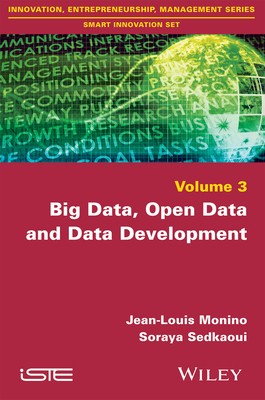
- We will send in 10–14 business days.
- Author: Jean-Louis Monino
- Publisher: John Wiley & Sons
- Year: 2016
- Pages: 170
- ISBN-10: 184821880X
- ISBN-13: 9781848218802
- Format: 15.6 x 23.4 x 1.1 cm, hardcover
- Language: English
- SAVE -10% with code: EXTRA
Reviews
Description
The world has become digital and technological advances have multiplied circuits with access to data, their processing and their diffusion. New technologies have now reached a certain maturity. Data are available to everyone, anywhere on the planet. The number of Internet users in 2014 was 2.9 billion or 41% of the world population. The need for knowledge is becoming apparent in order to understand this multitude of data. We must educate, inform and train the masses. The development of related technologies, such as the advent of the Internet, social networks, "cloud-computing" (digital factories), has increased the available volumes of data. Currently, each individual creates, consumes, uses digital information: more than 3.4 million e-mails are sent worldwide every second, or 107,000 billion annually with 14,600 e-mails per year per person, but more than 70% are spam. Billions of pieces of content are shared on social networks such as Facebook, more than 2.46 million every minute. We spend more than 4.8 hours a day on the Internet using a computer, and 2.1 hours using a mobile. Data, this new ethereal manna from heaven, is produced in real time. It comes in a continuous stream from a multitude of sources which are generally heterogeneous.
This accumulation of data of all types (audio, video, files, photos, etc.) generates new activities, the aim of which is to analyze this enormous mass of information. It is then necessary to adapt and try new approaches, new methods, new knowledge and new ways of working, resulting in new properties and new challenges since SEO logic must be created and implemented. At company level, this mass of data is difficult to manage. Its interpretation is primarily a challenge. This impacts those who are there to "manipulate" the mass and requires a specific infrastructure for creation, storage, processing, analysis and recovery. The biggest challenge lies in "the valuing of data" available in quantity, diversity and access speed.
EXTRA 10 % discount with code: EXTRA
The promotion ends in 20d.08:16:09
The discount code is valid when purchasing from 10 €. Discounts do not stack.
- Author: Jean-Louis Monino
- Publisher: John Wiley & Sons
- Year: 2016
- Pages: 170
- ISBN-10: 184821880X
- ISBN-13: 9781848218802
- Format: 15.6 x 23.4 x 1.1 cm, hardcover
- Language: English English
The world has become digital and technological advances have multiplied circuits with access to data, their processing and their diffusion. New technologies have now reached a certain maturity. Data are available to everyone, anywhere on the planet. The number of Internet users in 2014 was 2.9 billion or 41% of the world population. The need for knowledge is becoming apparent in order to understand this multitude of data. We must educate, inform and train the masses. The development of related technologies, such as the advent of the Internet, social networks, "cloud-computing" (digital factories), has increased the available volumes of data. Currently, each individual creates, consumes, uses digital information: more than 3.4 million e-mails are sent worldwide every second, or 107,000 billion annually with 14,600 e-mails per year per person, but more than 70% are spam. Billions of pieces of content are shared on social networks such as Facebook, more than 2.46 million every minute. We spend more than 4.8 hours a day on the Internet using a computer, and 2.1 hours using a mobile. Data, this new ethereal manna from heaven, is produced in real time. It comes in a continuous stream from a multitude of sources which are generally heterogeneous.
This accumulation of data of all types (audio, video, files, photos, etc.) generates new activities, the aim of which is to analyze this enormous mass of information. It is then necessary to adapt and try new approaches, new methods, new knowledge and new ways of working, resulting in new properties and new challenges since SEO logic must be created and implemented. At company level, this mass of data is difficult to manage. Its interpretation is primarily a challenge. This impacts those who are there to "manipulate" the mass and requires a specific infrastructure for creation, storage, processing, analysis and recovery. The biggest challenge lies in "the valuing of data" available in quantity, diversity and access speed.


Reviews